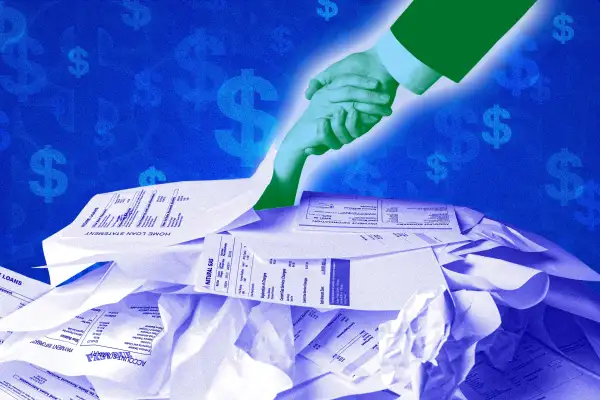Inside the Biden Administration's Plan to Stop 'Out-of-Control' Overdraft Fees

Pesky overdraft fees from banks and credit unions could soon get a major overhaul, collectively saving Americans an estimated $3.5 billion a year.
The Consumer Financial Protection Bureau, or CFPB, announced Wednesday that it intends to curb overdraft fees from big banks by proposing fee limits and treating overdrafts more like loans, which are subject to stricter oversight.
"We really want people to be able to compare apples to apples," CFPB Director Rohit Chopra tells Money. "Right now, when you take out a loan, you get clear disclosures. There's some core consumer protections. The overdraft loophole allows banks to sidestep that."
The loophole in question is one that exempts overdrafts from provisions of the Truth in Lending Act, which protects people from unfair lending practices and requires financial institutions to disclose annual percentage rates on their loan products. In recent years, the CFPB argues, this has allowed large banks to rely on overdraft fees as a core part of their business model. Overdraft services went from an occasional courtesy to what Chopra calls a "massive profit machine."
Banks charge overdraft fees when you make a transaction that would bring your balance below zero. The bank allows your transaction to go through but makes your account balance negative, adding a penalty in the process. The CFPB sees the lucrative practice as a loan and now wants to regulate them as such.
"You always have to worry when a financial company is rooting for their own customers to slip up or go bust," Chopra says.
If finalized, the rule would apply to financial institutions with more than $10 billion in assets. These institutions would have two options: Either charge a “break-even” fee — likely between $3 and $14 — or treat overdrafts as a line of credit. Choosing the latter would mean complying with all the legal protections that entails, such as making ability-to-repay determinations, clearly disclosing rights and interest rates and offering alternative repayment options.
Advocates have been fighting for an end to overdraft fees and similar non-sufficient fund (NSF) fees entirely. While the CFPB's rule was largely applauded by consumer advocacy groups on Wednesday, some expected more from the rule.
In the case of NSF fees, which are not included in the CFPB's proposal, banks charge a fee of a similar amount and decline the transaction. Chopra acknowledged the exclusion in an interview with Money, saying that the new rule is a framework to treat overdrafts as loans. Since the transaction is declined in the case of NSF fees, there is no real extension of credit by the bank. But he notes that these, too, can be exploitative, adding "to stay tuned for more on NSF fees."
'Penalizing you for being poor'
Carla Sanchez-Adams, a senior attorney at the nonprofit National Consumer Law Center (NCLC), says that overdraft fees typically run about $35 dollars and have no relationship to the actual cost of the bank covering the overdraft.
In most cases, the fees are triggered for overdrafts of less than $26 and are repaid quickly, usually within three days, according to the CFPB. That's the equivalent of a whopping 16,000% APR — way above the legal limit.
The CFPB calls these charges “junk fees” and says they are getting “out of control.” The agency started cracking down on overdrafts in 2021, spurring major banks like Capital One and Bank of America to eliminate or reduce them. In 2022, the CFPB put out a public call for feedback on junk fees and received more than 80,000 responses — the "overwhelming majority" of which were complaints about overdraft and NSF fees, the agency says.
Despite recent industry reforms, banks are still pulling in between $9 and $10 billion per year from people who overdraw their accounts.
“It’s just profit,” Sanchez-Adams says. “They’re penalizing you for being poor.”
Financial institutions don't always see it that way. The American Bankers Association, a major banking trade group, railed against the proposal, saying that the CFPB is essentially taking overdraft protections away from people who want and need them.
"Today’s proposal from the CFPB marks the Bureau’s latest attempt to demonize and mischaracterize highly regulated and clearly disclosed bank fees," Rob Nicols, president and CEO of the ABA, said in a statement. "Surveys consistently show Americans value and appreciate" overdrafts services, he added.
The rule is far from a done deal; the earliest it could be approved is October. First, the CFPB must hold a public comment period before finalizing the rule, which must then clear Congress, and the agency is clearly primed for a fight.
The NCLC, which has long called for overdraft reforms, says overdraft fees plague low-income Americans and people of color in particular. A recent CFPB report backs that up, finding that more than 1 in 4 households got hit with an overdraft fee within the past year — and many low-income households were hit with numerous fees, sometimes 10 or more in a year.
“Some consumers appear to use overdrafts often and intentionally as a source of credit, even with their high cost,” the report states.
Soon, federal law could catch up to those consumers who have long treated overdrafts that way.
More from Money:
Savings Account APYs Are Likely to Drop Soon. What's Your Next Move?

